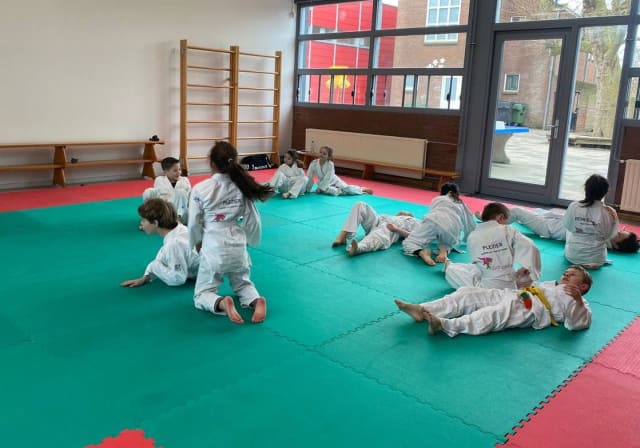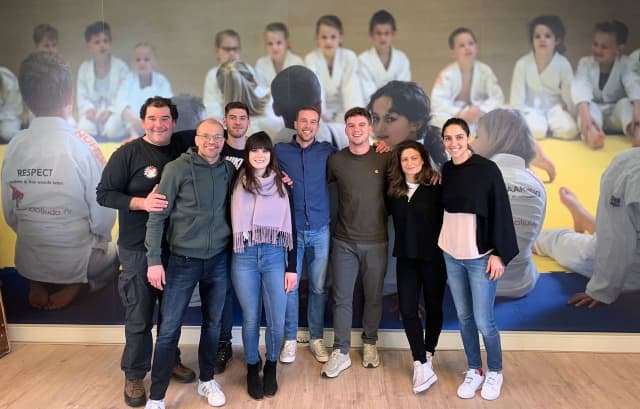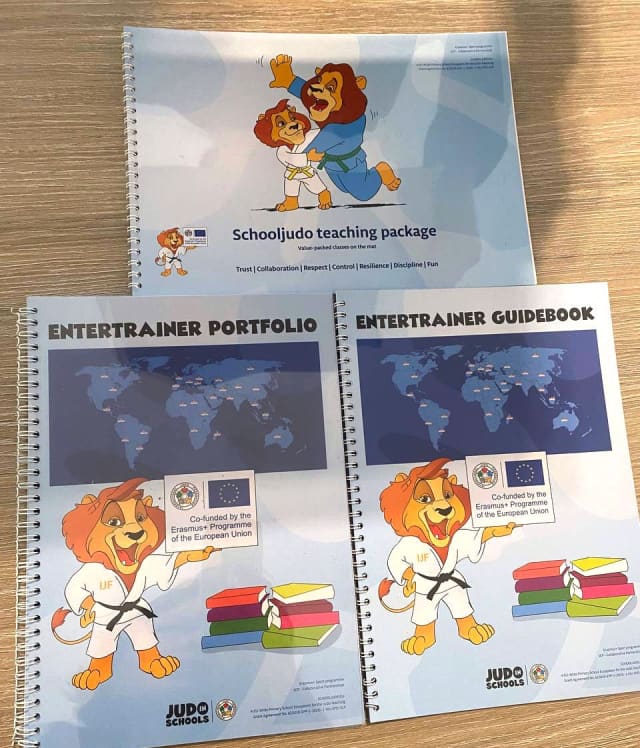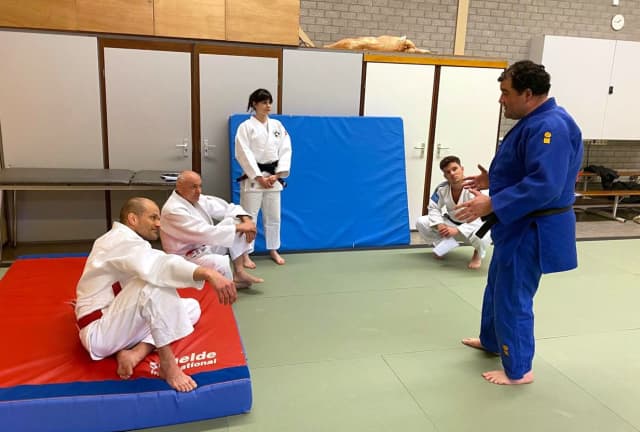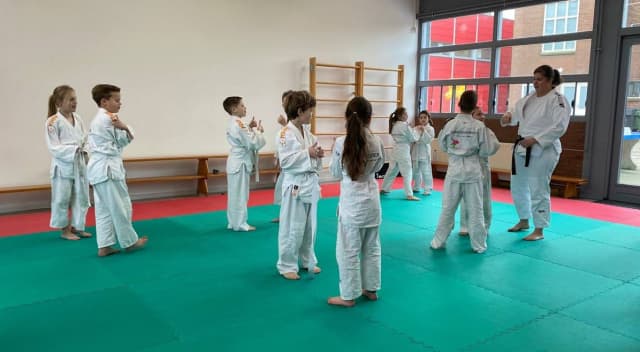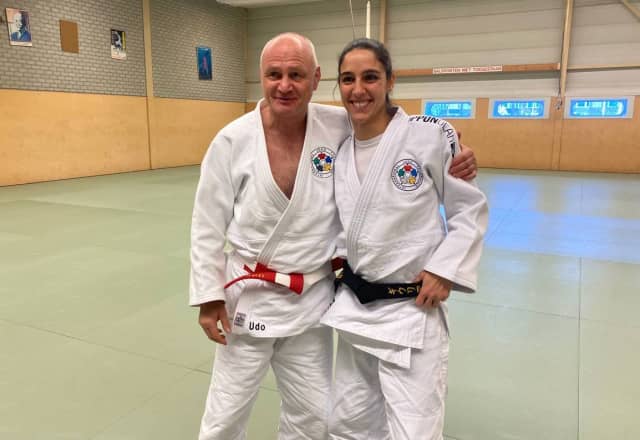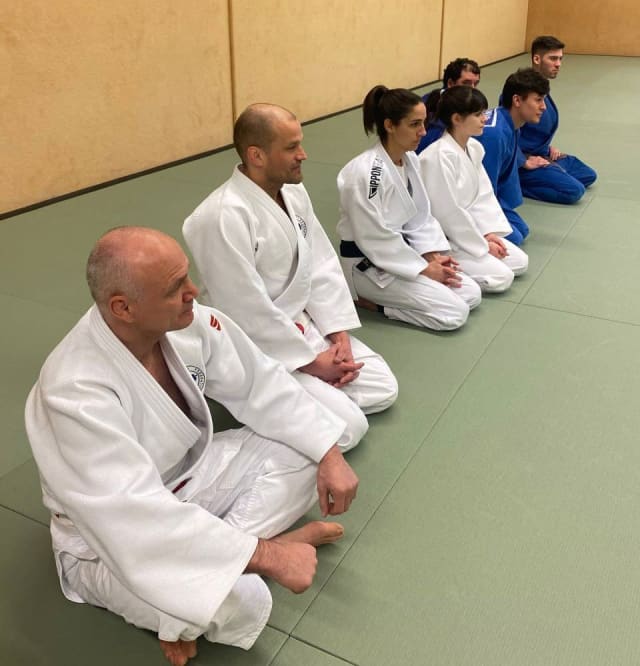The participants were joined by judo legend Udo Quellmalz (GER), world and Olympic champion, who was accompanied by a young judo teacher, Chris Dominik Lammers, both enjoying the opportunity to discover what is needed to develop these activities. A new judo values-based school project will begin soon in Leipzig, Germany, close to where Udo and Chris are based.
The first day of the Entertrainer meeting saw the group gather at the 2 Basics office in Haarlem, to discus school judo in the Netherlands, developed by IJF Head of the Judo for Children Commission, Ruben Houkes. They were able to reflect on how the concept and planning of SchoolJudo.eu were developed, from the methodology itself to the logistical implications and the Entertrainer materials.
Miroslav Boštjan Bilič said, “This was really great! It was a perfect moment and great timing. I enjoyed it because getting to know this system, seeing how it works, is really amazing and totally different from our system, so I learned a lot. For instance, the way they approach the children and the way they talk to them is different. They interact a lot and ask for their feedback throughout the sessions. Everything is done in alignment with the children's opinions. This is really cool. The business model is also very interesting, like what they have done with Disney."
Together with the different stakeholders, the IJF is now building the experimentation phase of the project, with the three pilot programmes that will be held in Slovenia, Italy and Hungary. During the meeting, the Entertrainers worked with the teaching tools, the Entertrainer guidebook, Entertrainer portfolio and the Entertrainer teaching pack.
The morning sessions provided an opportunity to speak with former and current Entertrainers from the SchoolJudo.NL programme so they could ask questions about their experiences from an inside perspective. At the end of the first morning, the Entertrainers had the opportunity to strategise, thinking about how they may use the teaching tools and additional knowledge in their school judo lessons, to support social-emotional learning.
In the afternoon of day 1, the group came together on the tatami to experience concretely what they had learned during the morning session and in the previous webinars. This practical session was led by Entertrainers from SchoolJudo.NL (Jimmy Van Meurs from the children commission and Rex Stoelinga)
Leandra Freitas, from the IJF Judo for Children Commission explained, "We participated in a successful practical afternoon with demo exercises, feedback and review, knowledge sharing and discussion. This gave our Entertrainers, preparing for their pilot projects, the opportunity to put their knowledge and skills into practice with the support of the group."
Udo Quellmalz expressed his opinion, "I've known Ruben for a long time. What he created here in the Netherlands is very impressive. It is a great model. We started in our city with one school and it was great to come here and get some tips on how to introduce judo to children on a practical level and on how to introduce the values. The practical session was very good because theory is one thing, but practising is another. Great experience!”
Day 2 started with a visit to a local school which has been participating in the School Judo programme in the Netherlands for the last 4 years.
Some years ago, it all began with one year group and just one class and after four years, every class in the school was participating as part of their school day. Leandra Freitas added, "This visit provided our brand new Entertrainers with a first-hand view of how a usual School Judo session could look and provided them with the chance to ask the children and their own Entertrainers questions. We then had a discussion with the class teacher of one of the older year groups, who first started with School Judo 4 years ago and also with the school Principal."
Laura Gies is one of the Entertrainers of the School Judo programme in the Netherlands. For her, "What is the most important part is the fun and the values, how we cooperate with the children and see the results of that in the classroom. Each lesson is 45 minutes long. We need 20 minutes to install everything and I have four judo sessions per day with different age groups."
Suzanne Nagelkerke is the headmistress of the school visited by the delegation. She said, "We started the School Judo programme a few years ago. Judo is a respectful sport. There is a fine line between fighting and play. With judo we teach them to understand the difference between fighting and playing. It's not only on the tatami that it is valid but everywhere. They have to understand what is ok for you and for me. If we are playing together, what is right for you and for me? Judo is a perfect opportunity to do that. We see the enthusiasm of the children. We were looking for a way to propose the activity to a class for the whole year. When children are coming here, we tell to the parents that they are here to learn mathematics and other subjects, but that they are also part of a group, part of a school, part of a family and they have to learn about that as well. They need to learn who they are and who they want to be. For this the project 'Hero' developed with School Judo is very helpful."
Maaike Rutter, the group’s teacher, added, "Every week we talk about the different values. The children are encouraged to put into words what is important and how they can interact with each other. Children here are well behaved, socially stable. We have the tools to help them react and interact properly. We try to connect the physical lessons with other educational activities and to reveal for the children an understanding of the importance of the values. We create connections again and again and again.”
Following the visit, the workshop members returned to the office where the Entertrainers had the opportunity to ask final questions and discuss what they saw at the judo lesson in the school, reflecting on how what they saw in the lesson inspired them for their own School Judo launch.
At the end of the two day seminar Ruben Houkes said, "It is all about practical learning and experiencing. It's about what we can do better today than we did yesterday."
Within a few weeks the three pilot programmes will be up and running in Italy, Hungary and Slovenia. Those will be based on the experience gained in the Netherlands as well as on the experience those three countries have already, since Judo for Children programmes have been developing there already for a long time. It is guaranteed that the work done in the Netherlands and in the other countries will help to further develop a programme which is already a success. The pilots are ready to fly!

